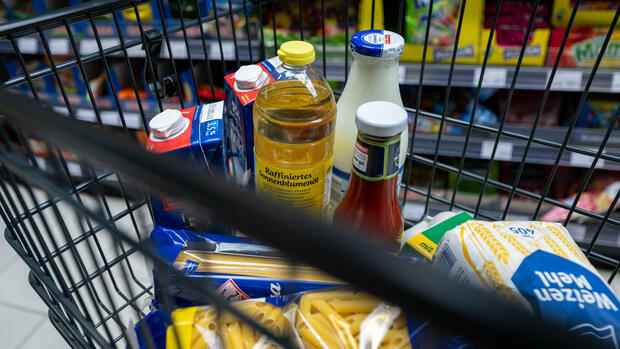Many consumers are currently shopping less.
(Photo: dpa)
Berlin The federal and state tax revenues increased by a minimal 0.3 percent to 60 billion euros compared to the previous year, as the Federal Ministry of Finance announced in its monthly report on Friday.
The reason for the small increase compared to the previous months was therefore primarily two of the measures that the federal government had decided to mitigate the higher energy costs. The child bonus for 2022 of 100 euros was paid out in July. In addition, the increase in the basic tax-free allowance and the employee lump sum – each retrospectively since the beginning of 2022 – would have had a positive impact on many employees.
“As a result, there was a significant decline in income tax revenue compared to the previous year.” There was a minus of nine percent. On the other hand, there was a strong increase of almost 88 percent within a year in the so-called non-assessed income taxes. This is due to the significant increase in dividend payouts this year compared to 2021.
While federal taxes rose 0.8 percent in July, state tax revenues fell 16.7 percent. In the first seven months of the year, tax revenue climbed a total of 14.9 percent to 468 billion euros.
Top jobs of the day
Find the best jobs now and
be notified by email.
After a surprisingly good start to the year with growth of 0.8 percent, the German economy only stagnated in the spring. “The outlook for further development is currently noticeably clouded,” the ministry said. The significantly lower gas deliveries from Russia, the persistently high price increases for energy and increasingly also other goods weighed heavily on economic development.
According to a survey, most consumers in Germany have also adapted their purchasing behavior to rising prices: Seven out of ten respondents (70 percent) state in the current “DeutschlandTrend für das ARD Morgenmagazin” that they are already using less energy in order to reduce costs – again more than in April of this year (64 percent). Almost half buy less in everyday life (47 percent). The proportion of those who are more economical in their leisure time and, for example, visit restaurants, cinemas and leisure facilities less frequently, is even slightly higher (50 percent). 43 percent of Germans say that they will limit their vacation trips this year.
Restrictions on spending are particularly noticeable in less financially strong households. Around two thirds (66 percent) of those surveyed with a rather low income (household income up to 1500 euros per month) state that they shop less in everyday life, visit restaurants, cinemas and leisure facilities less often (67 percent) and limit their vacation trips this year (59 Percent). In comparison, about half of those surveyed from middle-income households (household income 1,500 to 3,500 euros per month) do so. When it comes to reducing energy consumption, on the other hand, there are no major differences between the income groups.
In addition, the supply chain disruptions, which lasted longer than expected, also in connection with China’s zero-Covid policy, said the Federal Ministry of Finance. Further developments remain characterized by a high degree of uncertainty. The government is expected to present a new economic forecast on October 12.
More: An unpleasant call for Olaf Scholz – Israeli newspaper: The chancellor “failed miserably”
